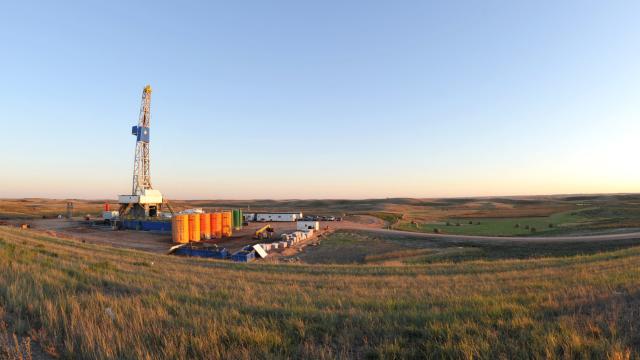The pandemic has dramatically decreased demand for oil and gas, and a new analysis shows producers are responding to the dip. Companies are idling the tools that help them tap fossil fuels under the Earth, slowing exploration down.
According to oilfield services company Baker Hughes, the number of operational rigs in the country dropped from 876 to 241 between August 2019 and August 2020. In that time span, the country’s top oil-producing state of Texas lost nearly a quarter of its rigs. North Dakota, the next biggest oil producing state, saw an even steeper shift, with its oil and gas rig count dropping from 51 in August 2019 to 10 this August. And Wyoming, which had 39 oil and gas rigs operating in August 2019 and 25 open in January, closed its last rig last month, marking only the second time since 1884 that the state has had zero in operation.
Meanwhile, the demand for fossil fuels is continuing to fall, so oil and gas prices are continuing to do the same. Oil prices plummeted on Tuesday morning, as did the price of natural gas. It’s becoming increasingly clear that these deadly energy sources are no longer a good investment, so rig closures are likely to continue.
This all means that a lot less oil and gas is getting produced. The Energy Bulletin reports, for instance, that Permian Basin gas production dropped by roughly 250 million cubic feet per day in August 2020 compared to the previous month.
Though it’s tempting to dance on the fossil fuel industry’s grave, there’s nothing to celebrate about the way these rigs are being shut down. While the industry is winding some down, officials are merely abandoning others and letting them fall into into disrepair, which can be environmentally devastating.
The rig closures can be economically devastating, too, since fossil fuels constitute the backbone of many states’ economies. Pete Obermueller, executive director of the Petroleum Association of Wyoming Executive Director, told USA Today that each rig accounts for roughly 100 jobs. And in Texas, for instance, the state economy rises and falls with oil. Not only are hundreds of thousands of people employed directly by extractive industries, schools and other public goods are also dependent on fossil fuel companies’ tax revenue to run. Entire service economies have also sprung up in oil towns, meaning thousands of other jobs depend on oil workers’ continued gainful employment.
We do, of course, need to stop producing fossil fuels. Failure to do so rapidly will completely wreck the climate and put billions in danger. But we need to do so in a planned way — one that prioritises workers and communities over fossil fuel executives.
The solutions for doing so are there. We could force fossil fuel companies and the government to take care of laid off workers, providing them with benefits and health care. Workers could also take up new jobs that fit with the clean energy economy, including working on capping and cleaning up the thousands of oil and gas wells that dot the landscape. We could also help cities build new, sustainable economies by expanding clean infrastructure and cleaning up pollution there as well. That will all take tons of investment, but there’s never been a better time to do just that.
